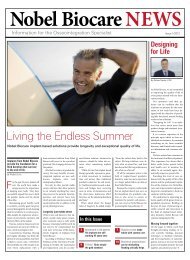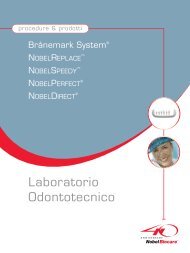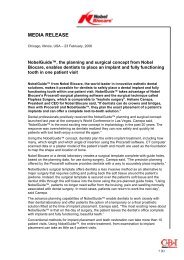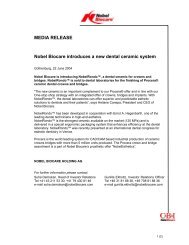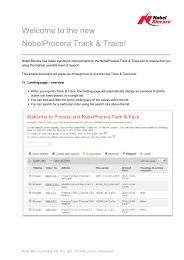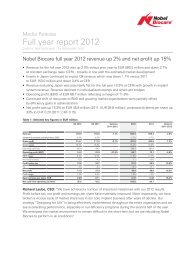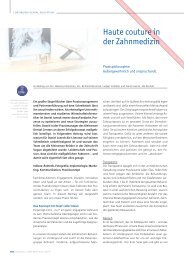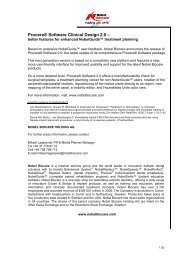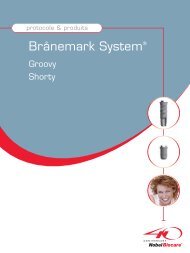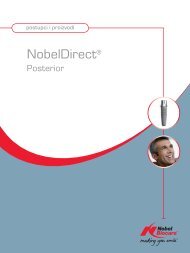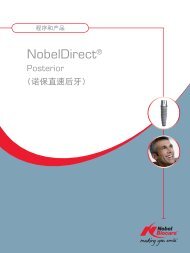Annual Report 2003 - Nobel Biocare Corporate
Annual Report 2003 - Nobel Biocare Corporate
Annual Report 2003 - Nobel Biocare Corporate
- No tags were found...
Create successful ePaper yourself
Turn your PDF publications into a flip-book with our unique Google optimized e-Paper software.
NOBEL BIOCARE ANNUAL REPORT <strong>2003</strong>25the company. Thus, gender equalityand respect for people, regardless ofage, cultural and ethnical backgroundis of core importance to <strong>Nobel</strong> <strong>Biocare</strong>.Personal development andtrainingIn an organization such as <strong>Nobel</strong><strong>Biocare</strong>’s, with a large proportion ofyoung and well-educated employeesstarting their professional careers, itis vitally important to make full useof the enthusiasm of employees’ selffulfilmentand career planning. Thecompany’s skills development programis based on structured performancereviews, which results in an individualtraining scheme for each employee.<strong>Nobel</strong> <strong>Biocare</strong> also operates a globalweb-based introduction programfrom which managers set up activitiesfor newly hired employees. Furthermore,there is a common programfor new ‘leaders’ that is divided into ageneral leadership training moduleand one specific to <strong>Nobel</strong> <strong>Biocare</strong>.Setting salaries and incentiveschemesWorking at <strong>Nobel</strong> <strong>Biocare</strong> bringsboth demands and exciting opportunitiesfor professional and personaldevelopment. This is also reflected inthe company’s salary policy, aimed atencouraging self-esteem and goodperformance. The factors governingremuneration encompass nature of thework, the competence and personalability of the employee, as well asmarket factors.Most employees at <strong>Nobel</strong> <strong>Biocare</strong>are covered by different kinds ofbonus schemes. For employeesinvolved in marketing and sales activities,the variable part of the salary isconsiderable. The company also hasa staff option scheme for 125 keypersonnel, which has been runningsince 2001.Health and safety issuesLegislation on health and safety issuesdiffers from one country to another.In Sweden, for example, there arelaws and regulations governing howto act when confronted with repetitivehealth absence, how to follow upaccidents and injuries and alike. Inthe US, every company is obliged tohave an Injury and Illness PreventionPlan with targets for such issues.<strong>Nobel</strong> <strong>Biocare</strong> always views nationallegislation as a platform for furtheractivities.Employees in figures Employees per region (%)2001 2002 <strong>2003</strong>No. of employees on 31 December 1 228 1 330 1 363Average No. of employees 1 247 1 326 1 338Percentage women 50 46 47Average age of employees 38.7 39.0 39.3Sales per average No. of employee (EUR) 231 100 234 683 249 610EBIT per average No. of employee (EUR) 31 300 47 535 65 192Personnel cost per averageNo. of employee (EUR) 66 693 65 709 63 657Net profit per average No. of employee (EUR) 16 207 28 509 53 802Value added per employee (EUR) 97 803 112 387 138 8496005004003002001000Youngerthan 2425–34■ 31 Sweden■ 33 North America■ 25 Europe (excl. Sweden)■ 6 Asia/Pacific■ 5 OthersAge Structure <strong>Nobel</strong> <strong>Biocare</strong> Group(headcount)2744454826810735–44 45–54 Olderthan 54<strong>Nobel</strong> <strong>Biocare</strong> has employees working in 28 countries (27). The majority are in the US, Sweden, and Germany. In <strong>2003</strong>, the company opened a subsidiary inSouth Africa. The company’s largest sites in terms of employees are Yorba Linda, California, USA , Göteborg, Sweden and Karlskoga, Sweden.



